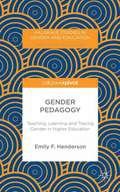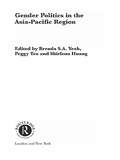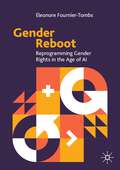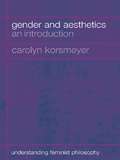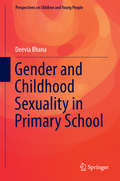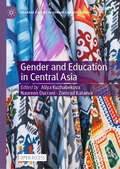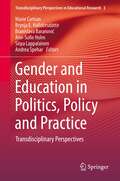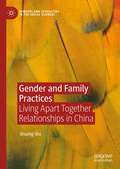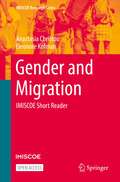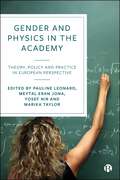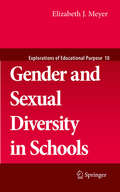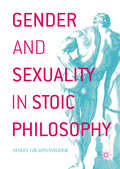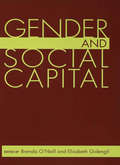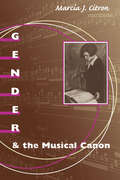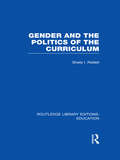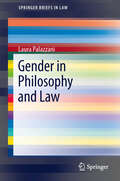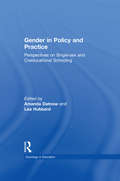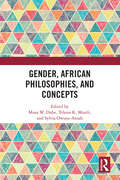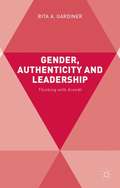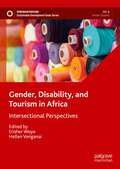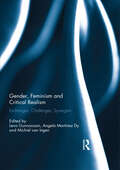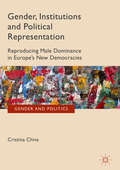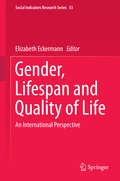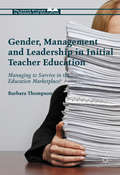- Table View
- List View
Gender Pedagogy: Teaching, Learning and Tracing Gender in Higher Education
by Emily F. HendersonWhen addressed in its full reactive potential, gender has a tendency to unfix the reassuring certainties of education and academia. Gender pedagogy unfolds as an account of teaching gender learning that is rooted in Derrida's concept of the 'trace', reflecting the unfixing properties of gender and even shaking up academic knowledge production.
Gender Politics and Mass Dictatorship
by Karen Petrone Jie-Hyun LimUsing mass dictatorship as a working hypothesis to comprehend support for dictatorship from below, this book concentrates on the gender politics deployed by dictatorial regimes such as Nazism, Stalinism, 'really existing socialism' in the GDR and People's Poland, Maoist China, the development dictatorship in South Korea, and colonial empires. 20th century dictatorial regimes used gender politics as a lever to mobilize men and women as voluntary participants in state projects. Ironically enough, women under dictatorships could become important players in the previously male-dominated public sphere in exchange for voluntary mobilization. But both men and women were not passive objects of gender politics. Men both embraced and rejected the masculine roles set out for them; and the dictatorial regimes' invitation to participate in the public sphere, designed for the self-mobilization of women, was often used by women for self-empowerment. This book shows the twisted paths of citizens' lives under the dictatorial regimes as they veered between self-mobilization and self-empowerment.
Gender Politics in the Asia-Pacific Region (Routledge International Studies of Women and Place #No.3)
by Brenda S.A. Yeoh Peggy Teo Shirlena HuangAmidst the unevenness and unpredictability of change in the Asia-Pacific region, women's lives are being transformed. This volume takes up the challenge of exploring the ways in which women are active players, collaborators, participants, leaders and resistors in the politics of change in the region. The editors focus attention on the politics of gender as a mobilizing centre for identities, and the ways in which individualized identity politics may be linked to larger collective emancipatory projects based on shared interests, practical needs, or common threats. Collectively, the chapters illustrate the complexity of women's strategies, the diversity of sites for action, and the flexibility of their alliances as they carve out niches for themselves in what are still largely patriarchal worlds. This book will be of vital interest to scholars in a range of subjects, including gender studies, human geography, women's studies, Asian studies, sociology and anthropology.
Gender Reboot: Reprogramming Gender Rights in the Age of AI
by Eleonore Fournier-TombsThis book explores gender norms and women’s rights in the age of AI. The author examines how gender dynamics have evolved in the spheres of work, self-image and safety, and education, and how these might be reflected in current challenges in AI development. The book also explores opportunities in AI to address issues facing women, and how we might harness current technological developments for gender equality. Taking a narrative tone, the book is interwoven with stories and a reflection on the raising young children during the COVID-19 pandemic. It includes both expert and personal interviews to create a nuanced and multidimensional perspective on the state of women’s rights and what might be done to move forward.
Gender and Aesthetics: An Introduction (Understanding Feminist Philosophy)
by Carolyn KorsmeyerFeminist approaches to art are extremely influential and widely studied across a variety of disciplines, including art theory, cultural and visual studies, and philosophy. Gender and Aesthetics is an introduction to the major theories and thinkers within art and aesthetics from a philosophical perspective, carefully introducing and examining the role that gender plays in forming ideas about art. It is ideal for anyone coming to the topic for the first time. Organized thematically, the book introduces in clear language the most important topics within feminist aesthetics: Why were there so few women painters? Art, pleasure and beauty Music, literature and painting The role of gender in taste and food What is art and who is an artist? Disgust and the sublime. Each chapter discusses important topics and thinkers within art and examines the role gender plays in our understanding of them. These topics include creativity, genius and the appreciation of art, and thinkers from Plato, Kant, and Hume to Luce Irigaray and Julia Kristeva. Also included in the book are illustrations from Gaugin and Hogarth to Cindy Sherman and Nancy Spero to clarify and help introduce often difficult concepts. Each chapter concludes with a summary and further reading and there is an extensive annotated bibliography. Carolyn Korsmeyer's style is refreshing and accessible, making the book suitable for students of philosophy, gender studies, visual studies and art theory, as well as anyone interested in the impact of gender on theories of art.
Gender and Childhood Sexuality in Primary School
by Deevia BhanaThis book is an ethnography of teachers and children in grades 1 and 2, and presents arguments about why we should take gender and childhood sexuality seriously in the early years of South African primary schooling. Taking issue with dominant discourses which assumes children's lack of agency, the book questions the epistemological foundations of childhood discourses that produce innocence. It examines the paradox between teachers' dominant narratives of childhood innocence and children's own conceptualisation of gender and sexuality inside the classroom, with peers, in heterosexual games, in the playground and through boyfriend-girlfriend relationships. It examines the nuances and finely situated experiences which draw attention to hegemonic masculinity and femininity where boys and girls challenge and contest relations of power. The book focuses on the early makings of gender and sexual harassment and shows how violent gender relations are manifest even amongst very young boys and girls. Attention is given to the interconnections with race, class, structural inequalities, as well as the actions of boys and girls as navigate gender and sexuality at school. The book argues that the early years of primary schooling are a key site for the production and reproduction of gender and sexuality. Gender reform strategies are vital in this sector of schooling.
Gender and Education in Central Asia (Palgrave Studies in Gender and Education)
by Naureen Durrani Aliya Kuzhabekova Zumrad KataevaThis open access book brings together established and emerging scholars to explore policies, statistical trends and representative research on gender equity across post-Soviet Central Asia. The book provides an overview of policy development in the promotion of gender equity, a comparative summary of changes in gender equity indicators at various levels of education, and examples of current research on an array of issues relating to gender equity across the region. The chapters present a broad picture which will be relevant to scholars of educational reform, comparative education policy, international development and gender issues.
Gender and Education in Politics, Policy and Practice: Transdisciplinary Perspectives (Transdisciplinary Perspectives in Educational Research #3)
by Andrea Spehar Marie Carlson Brynja E. Halldórsdóttir Branislava Baranović Ann-Sofie Holm Sirpa LappalainenThis book presents ideas on education, gender and intersectionality through a transdisciplinary frame by crossing disciplinary and methodological borders. Exploring the diversity of educational settings ranging from early childhood to adult education, it brings together scholars from various disciplines to discuss, deconstruct and problematize gender and education in relation to several themes in a comparative, intersectional, local, national, regional and international perspective. Each chapter approaches the topic in an intersectional and/or transnational manner and creates powerful gendered educational knowledge. Questions addressed in the book include: What are the challenges or barriers to gender-equal education? How can we understand the gaps between formal policies and educational practices? The chapters in the book illustrate how gender and education are relevant and needed concepts within the field of transdisciplinary research. The authors hail from a range of countries, such as Croatia, Indonesia, Turkey, UK, as well as the Nordic region, and they critically examine gender and education at all levels and in diverse sectors, and with varied lenses, such as neoliberalism in education, and the inclusion of newcomers and refugees. The work also critically investigates programs and pedagogical approaches, culture and values, knowledge and identity in teacher education. The book further addresses criticisms of Western and Anglophone bias around “white feminism” and the norm of white, male and heterosexual privilege.
Gender and Family Practices: Living Apart Together Relationships in China (Genders and Sexualities in the Social Sciences)
by Shuang QiuThis book examines how gender and heterosexuality structure the lived experiences of people in living apart together (LAT) relationships in contemporary Chinese society. Using in-depth interview data with Chinese LAT people of different ages, the author explores why they live apart; how they construct and make sense of their everyday family lives and negotiate their gender roles; and how they experience intimacy while being physically apart. This text sheds new insights on non-cohabitating intimate partnerships by bringing together themes of gender, family, intimacy, and relationality. Through looking at people’s lived experiences in LAT relationships, it argues that practices of family and intimacy are closely implicated with doing gender, and consequently, that gendered family lives and heterosexuality are reconstructed, rather than deconstructed, in order to reclaim conventional forms of family and gender norms in Chinese social, historical and cultural contexts.This book will be of interest to scholars across Gender and Sexuality Studies as well as Family Studies, in addition to scholars of contemporary Chinese culture and society.
Gender and Migration: IMISCOE Short Reader (IMISCOE Research Series)
by Eleonore Kofman Anastasia ChristouThis open access short reader offers a critical review of the debates on the transformation of migration and gendered mobilities primarily in Europe, though also engaging in wider theoretical insights. Building on empirical case studies and grounded in an analytical framework that incorporates both men and women, masculinities, sexualities and wider intersectional insights, this reader provides an accessible overview of conceptual developments and methodological shifts and their implications for a gendered understanding of migration in the past 30 years. It explores different and emerging approaches in major areas, such as: gendered labour markets across diverse sectors beyond domestic and care work to include skilled sectors of social reproduction; the significance of families in migration and transnational families; displacement, asylum and refugees and the incorporation of gender and sexuality in asylum determination; academic critiques and gendered discourses concerning integration often with the focus on Muslim women. The reader concludes with considerations of the potential impact of three notable developments on gendered migrations and mobilities: Black Lives Matter, Brexit and COVID-19. As such, it is a valuable resource for students, academics, policy makers, and practitioners.
Gender and Physics in the Academy: Theory, Policy and Practice in European Perspective
by Pauline Leonard, Meytal Eran Jona, Yosef Nir, and Marika TaylorThis innovative interdisciplinary collection confronts the worldwide challenge of women's under-representation in science through an interrogation of the field of physics and its gender imbalance. Leading physicists and sociologists from across Europe collaborate to adopt a comparative approach. They draw on theoretical perspectives and empirical evidence to explore the reasons behind low participation levels, from entering the field to sustaining a career, emphasising the importance of social perspectives over biological explanations. Evaluating policy solutions implemented in various European contexts, this book offers key insights into the world of women physicists and sheds light on their life stories.
Gender and Sexual Diversity in Schools
by Elizabeth J. MeyerIssues related to gender and sexual diversity in schools can generate a lot of controversy, with many educators and youth advocates under-prepared to address these topics in their school communities. This text offers an easy-to-read introduction to the subject, providing readers with definitions and research evidence, as well as the historical context for understanding the roots of bias in schools related to sex, gender, and sexuality. Additionally, the book offers tangible resources and advice on how to create more equitable learning environments. Topics such as working with same-sex parented families in elementary schools; integrating gender and sexual diversity topics into the curriculum; addressing homophobic bullying and sexual harassment; advising gay-straight alliances; and supporting a transgender or gender non-conforming student are addressed. The suggestions offered by this book are based on recent research evidence and legal decisions to help educators handle the various situations professionally and from an ethical and legally defensible perspective.
Gender and Sexuality in Stoic Philosophy
by Malin Grahn-WilderThis book investigates the Ancient Stoic thinkers’ views on gender and sexuality. A detailed scrutiny of metaphysics, ethics and political philosophy reveals that the Stoic philosophers held an exceptionally equal view of men and women’s rational capacities. In its own time, Stoicism was frequently called ‘ the manly school’ of philosophy, but this volume shows that the Stoics would have also transformed many traditional notions of masculinity. Malin Grahn-Wilder compares the earlier philosophies of Plato and Aristotle to show that the Stoic position often stands out within Ancient philosophy as an exceptionally bold defense of women’s possibilities to achieve the highest form of wisdom and happiness. The work argues that the Stoic metaphysical notion of human being is based on strikingly egalitarian premises, and opens new perspectives to Stoic philosophy on the whole.
Gender and Social Capital (Gender Politics--Global Issues)
by Elisabeth Gidengil Brenda O'NeillThe volume brings together a stellar group of contributors who examine the social capital thesis by means of four different approaches: theoretical, historical, comparative, and empirical. In the end, this book will serve to answer two fundamental questions which have hitherto been neglected: What can a gendered analysis tell us about social capital? And what can social capital tell us about women and politics?
Gender and the Musical Canon
by Marcia J. CitronA classic in gender studies in music Marcia J. Citron's comprehensive, balanced work lays a broad foundation for the study of women composers and their music. Drawing on a diverse body of feminist and interdisciplinary theory, Citron shows how the western art canon is not intellectually pure but the result of a complex mixture of attitudes, practices, and interests that often go unacknowledged and unchallenged. Winner of the Pauline Alderman Prize from the International Alliance of Women in Music, Gender and the Musical Canon explores important elements of canon formation, such as notions of creativity, professionalism, and reception. Citron surveys the institutions of power, from performing organizations and the academy to critics and the publishing and recording industries, that affect what goes into the canon and what is kept out. She also documents the nurturing role played by women, including mothers, in cultivating female composers. In a new introduction, she assesses the book's reception by composers and critics, especially the reactions to her controversial reading of Cécile Chaminade's sonata for piano. A key volume in establishing how the concepts and assumptions that form the western art music canon affect female composers and their music, Gender and the Musical Canon also reveals how these dynamics underpin many of the major issues that affect musicology as a discipline.
Gender and the Politics of the Curriculum (Routledge Library Editions: Education)
by Sheila RiddellThis book uses detailed case studies of two secondary schools to examine the relationship between curriculum choice and gender identity among fourteen-year-old pupils making their first choices about what subjects to pursue at exam level. It reveals a two way process. Pupils’ decisions on what subject to take are influenced by how they perceive themselves in gender terms, and the curriculum once chosen reinforces their sense of gender divisions. The author looks at the influences on pupils at this stage in their lives from peers, family and the labour market as well as from teachers. She argues that the belief in freedom of choice and school neutrality espoused by many teachers can become an important factor in the reproduction of gender divisions, and that unless the introduction of the national curriculum is accompanied by systematic efforts to eradicate sexism from the hidden curriculum it will fail in its aim of creating greater equality of educational opportunity among the sexes.
Gender in Philosophy and Law
by Laura PalazzaniThis book is an introductory systematic framework in the complex and interdisciplinary sex/gender debate, focusing on philosophy of law.The volume analyses the different theories that have dealt with the gender category, highlighting the conceptual premises and the arguments of the most influential theories in the debate, which have had repercussions on the field of the ethical and juridical debate (with reference to intersexuality, transsexualism, transgender, homosexuality). The aim is to offer a sort of conceptual orientation in the complexity of the debate, in an effort to identify the various aspects and development processes of the theories, so as to highlight the conceptual elements of the theorisations to grasp the problem areas within them. It is therefore an overall synthetic and also explicative analysis, but not only explicative: the aim is to outline the arguments supporting the different theories and the counter-arguments too, for the purpose of proposing categories to weigh up the elements and to take one's own critical stance, with a methodological style that is neither descriptive nor prescriptive, but critical.
Gender in Policy and Practice: Perspectives on Single Sex and Coeducational Schooling (Sociology in Education)
by Lea Hubbard Amanda DatnowThis book exposes the complexity of single-sex schooling, and sheds new light on how gender operates in policy and practice in education. The essays collected in this volume cover a wide range of institutions, including K-12 and higher education, public and private schools, and schools in the US and beyond. Detailing the educational experiences of both young men and women, this collection examines how schooling shapes-and is shaped by- the social construction of gender in history and in contemporary society.
Gender, African Philosophies, and Concepts
by Musa W. Dube Telesia K. Musili Sylvia Owusu-AnsahThis volume sets out to explore, propose, and generate feminist theories based on African indigenous philosophies and concepts. It investigates specific philosophical and ethical concepts that emerge from African indigenous religions and considers their potential for providing feminist imagination for social justice-oriented earth communities. The contributions examine African indigenous concepts such as Ubuntu, ancestorhood, trickster discourse, Mupo, Akwaaba, Tukumbeng, Eziko, storytelling, and Ngozi . They look to deconstruct oppressive social categories of gender, class, ethnicity, race, colonialism, heteronormativity, and anthropocentricism. The book will be of interest to scholars of religion, philosophy, gender studies, and African studies.
Gender, Authenticity and Leadership: Thinking with Arendt
by Rita A. GardinerThis book examines the conceptual underpinnings of authentic leadership to discover why so little attention has been paid to gender. The author explores the failure to interrogate the complexities surrounding the concept of authenticity, especially as it relates to the diversity of lived experience.
Gender, Disability, and Tourism in Africa: Intersectional Perspectives (Sustainable Development Goals Series)
by Erisher Woyo Hellen VenganaiThis book explores the intersection of gender and disability in the context of tourism. In part, the book foregrounds feminist theorising of intersectionality by examining how gender can overlap with other social identities to contribute to more systemic oppression, domination, discrimination, and marginalisation of certain categories of people. Our point of departure is that disability does not operate in isolation as it is constituted and experienced within an already gendered social and tourism environment. With substantial research on the intersection of gender and tourism on the one hand, and the intersection of disability and tourism on the other hand, the interconnectedness of gender and disability and the implications this has on tourism policy and practice remains understudied. Thus, the book provides a critical lens that helps unpack underlying assumptions about gender and disability while questioning the dominant ideas about gender and disability reproduced through tourism policies and institutional practices in an African context. This book will be of interest to scholars and researchers in Gender Studies, Disability Studies, and Tourism Studies, particularly those with a research interest in Africa.
Gender, Feminism and Critical Realism: Exchanges, Challenges, Synergies
by Lena Gunnarsson Michiel Van Ingen Angela MartinezThis book marks a pivotal moment in the intensifying dialogue between the philosophical approach of critical realism and the fields of feminist theory and gender research. During the last three decades, these fields have been decisively influenced by poststructuralist perspectives. As such perspectives are increasingly being challenged, this book argues that critical realism is able to serve as a fruitful resource for carving out new paths for feminist theorizing and research. At the same time, it argues that feminist insights on gender and knowledge production have the potential to significantly enrich the field of critical realist philosophy as well. Hence, this book serves as a forum for a number of interventions that, in different ways, explore synergetic potentials as well as tensions between critical realist and various feminist perspectives. It engages in debates over the conditions of knowledge production and the relationship of knowledge to the world, offers new ways of understanding sex, gender and power, as well as the intersectional interplay of diverse power relations, and explores how critical realism relates to new materialist and postpositivist realist approaches. This book was originally published as a special issue of the Journal of Critical Realism.
Gender, Institutions and Political Representation
by Cristina ChivaThis book traces the struggles over the institutions of political representation in Central and Eastern Europe, focusing on the factors that have held women back over the post-communist period, as well as on the growing evidence for change throughout the region. Post-communist Europe has long raised two puzzles for scholars of women's representation in politics. First, why have women been under-represented in politics in every country in the region since communism's collapse? Secondly, why are there relatively few cases where women's advocates have been successful in pressing for change? This comparative study of Europe's new democracies argues that these puzzles are best understood as questions about male dominance - that is, about the mechanisms that sustain, or, alternatively, change long-established patterns of male over-representation in politics over time. The author covers six EU member states - Bulgaria, the Czech Republic, Hungary, Poland, Romania and Slovakia - during the period 1990-2016. The book will be of use to students and scholars in the fields of Comparative Politics, Democracy and Democratization, European Studies, Gender Studies, Post-Communist Studies, and Central and Eastern European Studies.
Gender, Lifespan and Quality of Life
by Elizabeth EckermannThis publication addresses the gender dimensions of people's lived experience and emphasizes how gender relationships differentially impact on women's and girls' as well as men's and boys' subjective well-being across the lifespan. It therefore fills a significant gap in the literature on quality of life and subjective well-being. The book brings together research which compares female's and male's subjective experiences of well-being at various life stages from a variety of countries and regions, particularly focusing on women's subjective well-being. Sex-disaggregation of data on objective conditions of quality of life is now routinely undertaken in many countries of the world. However, despite the burgeoning of objective data on sex differences in life conditions across the world, very little gender analysis is carried out to explain fully such difference and there is still a serious dearth of data on gender differences in subjective experiences of quality of life and well-being. This publication will assist researchers, teachers, service providers and policy makers in filling some of the gaps in currently available literature on the nexus between age and gender in producing differential experiences of subjective wellbeing.
Gender, Management and Leadership in Initial Teacher Education: Managing to Survive in the Education Marketplace? (Palgrave Studies in Gender and Education)
by Barbara ThompsonThis book highlights the difficulties that women working as managers and leaders in initial teacher education face. Teacher education is at the forefront of education reforms and yet little is known about the professional lives of those who work within it. Whereas many women are moving into positions of authority in teacher training, some existing women managers are being marginalized within new internally differentiated layers of managerial structures. Yet other female managers, mainly new appointees, seem to endorse the discourses associated with new managerialist practices. Simultaneously some women who manage in teacher training are engaged in a struggle for survival individually and professionally. In the main, men seem to be missing from authority positions and will conclude that, in the current climate, the management of teacher training is ‘no job for a man’.
